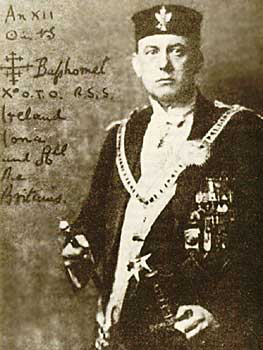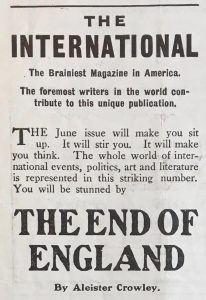The University of Glasgow’s School of Critical Studies is hosting a workshop titled “Popular Occulture in Britain, 1875-1947” today. University of Gothenberg professor Henrik Bogdan will be speaking about the Prophet of the Lovely Stars World War I (NOT II!) pro-German propaganda articles published in the United States.
The University’s site posted the following Abstract:
Often associated with secret forms of knowledge revealed only to carefully selected initiates, occultism might seem fundamentally opposed to the openness of popular culture. Nonetheless, during the massive “occult revival” of the late nineteenth and early twentieth centuries, in which older forms of esoteric belief and practice-scrying, alchemy, astral travel, and ritual magic- were rehabilitated or invented anew, occult ideas and figures became the stuff of mass culture, featuring regularly in popular fiction, film, and theatre and permeating social movements and political debates. Our project seeks to explain how and why the occult became so central to the period’s popular imagination. By focusing on the allure and reach of the occult in this period, our network aims to understand the relationship between popular culture, religious heterodoxy, and the public sphere more broadly.
The popular expressions of the occult revival can tell us much about the changing face of religious belief, literary taste, mass entertainment and public debate in the period of our study. Yet despite its crucial role as an index to changing religious, aesthetic, social attitudes, British popular occulture remains crucially understudied, often sidelined within humanities research to accounts of the reception of occultism within the avant garde cultures of modernism. Our network aims to redress this critical neglect by asking:
1) How and why did the occult ideas burst into the popular cultural mainstream during the period of our study?
2) What role did British popular occulture play in shaping ideas about social change, creativity, secularization, and the public sphere between 1875-1947?
3) What new perspectives on the stakes of popular occulture can be forged by bringing together scholars from across disciplines (history, literary, cultural, and periodical studies, theatre studies, religious studies) with librarians, curators, digital humanists, and non-academic holders of archives?
In asking these questions, we seek to break down the boundaries between esotericism and exotericism, between elite and the mass cultural forms, that have previously constrained studies of the occult revival.
To understand a subject as eclectic as popular occulture, it is necessary to take an interdisciplinary approach. The project brings together a range of scholars, curators, librarians, and non-academic holders of archives at three workshops, each focusing on a distinct interaction between occultism and British popular culture in the years between 1875-1947. The first will consider the encounter between the occult and popular fiction and entertainment; the second, the development of the occult public sphere through specialist periodicals and the reception of occultism in the mainstream press; the third, the contribution of occult ideas and proponents to popular social movements such as feminism, socialism, eugenics, and anti-imperialism. Academic participants will benefit from access to new disciplinary and methodological perspectives and the expertise of non-academic experts and stakeholders; curators, librarians, and archive holders will gain new angles on, and ways of contextualizing for the public, the rich popular legacy of the occult revival. All participants will benefit from the network’s promotion and facilitation of international collaboration. The project will maintain a website and blog, enabling conversation to continue between workshops and extending the network beyond immediate participants; it will host visits to key occult archives and sites in Glasgow, Dublin, and London, thus encouraging knowledge exchange between scholars, curators, librarians, archive holders, and digital humanists; it will impact on exhibitions of occult archives and art; and it will produce an edited essay collection of selected workshop talks, constituting the first scholarly book to focus solely on the popular dimensions of the British occult revival.


